What is Home Education and How Does It Look For Us?
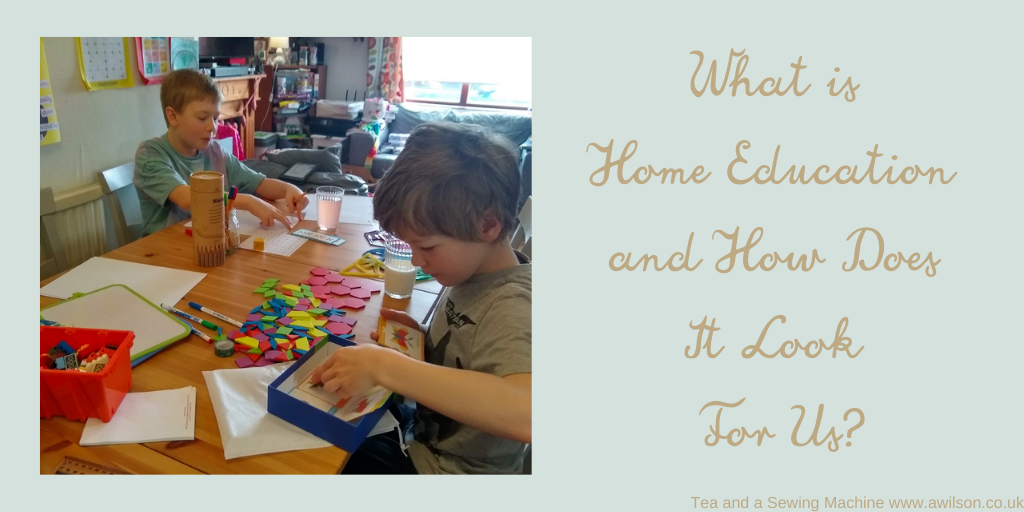
It’s time for a random post about something that’s nothing at all to do with sewing or making stuff!
You probably know already that I have 4 boys, and you might also know that I home educate the younger 2. I did have the 2nd one at home last year as well, but he went back to school in September for the start of secondary school.
Some people make the decision to home educate their children when they are babies. It wasn’t like this for us! My boys were all at school when we decided to take them out. Home education isn’t as common in England as it is in the USA, and everybody we knew with school aged kids sent their kids to school.
It was only when the third one, Barnabas, was having problems that we started to think about home education. I’d tried unsuccessfully to get them into a different school. The academy system in England means that lots of schools in one area will be run by the same people, and living in a rural area there wasn’t much choice anyway. Home education was the only other option.
So we removed them in September 2018. Aidan had just started in Year 6, Barnabas was in Year 4 and Cosmo was in Year 1.
It has been the best thing! Barnabas is a different child now, there are no homework battles and I don’t have to do the school run! There are no tests or extra classes. They’re learning all the time so there’s no need!
Aidan went back to school in September 2019 for the start of secondary school, and having a year of home education has done him no harm at all. In fact, he’s coped better than his older brother, probably at least partly because home education gave him the more opportunities to develop as an independent learner.
People often have questions about home education, and never more so than at the moment with most British children being at home instead of at school. Here are some of the questions I get asked all the time!
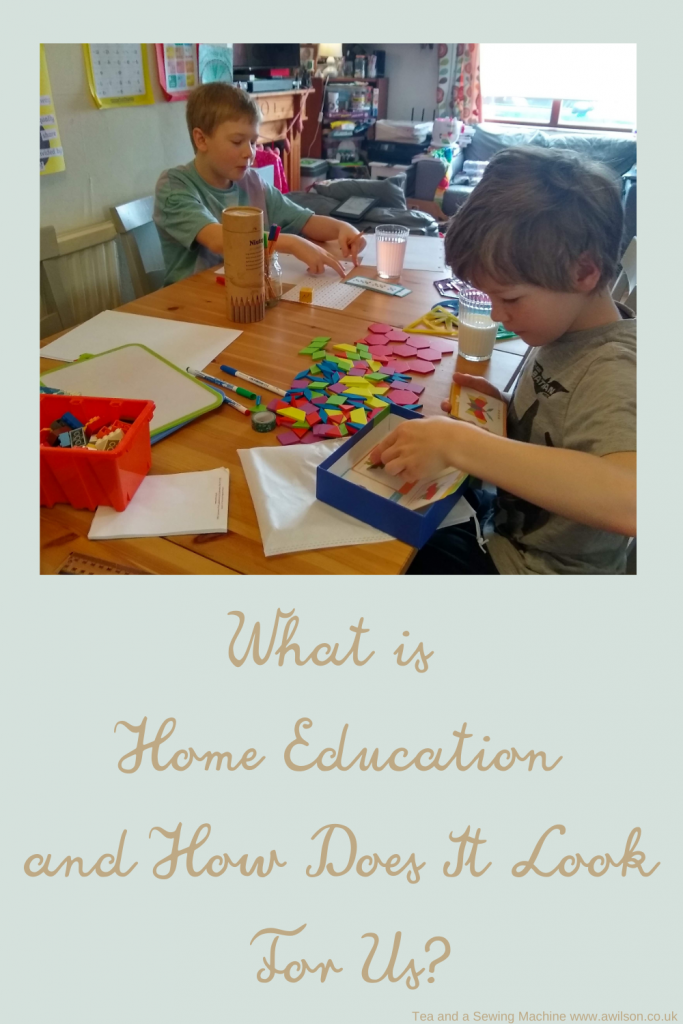
Do You Have to Follow the National Curriculum?
No, thank goodness!
I don’t rate the English National Curriculum at all. There’s too much emphasis on tests and rote learning, and the expectations put on young children are too high . I don’t believe that it’s providing our children with the skills they will need to thrive in the modern world.
Being able to do what we like means that we can follow our children’s interests, and encourage them to learn things that might actually prove to be useful, like computer programming.
It also means that things don’t have to be taught as discrete subjects, and we can take more of a “whole of life” kind of approach. Subjects often overlap, and things frequently make far more sense if they are seen as part of something larger.
Maps are a good example. I got the maps of Norfolk out last week for some maths. The boys were learning about ratio and proportion at Barnabas’ request, and I wanted them to understand that scales and ratios have a practical application.
I didn’t set them things to do. Maps are interesting and I didn’t want to take any of that away by making it like school! I did make some suggestions, like “Ooh, King’s Lynn! Can you work out how long it would take for us to walk from the bus station to the dentist instead of catching the bus?”
They were happy looking at the maps for about 45 minutes, and in that time we covered not only maths, but English, History, Geography and life skills as well.
What About Phonics?
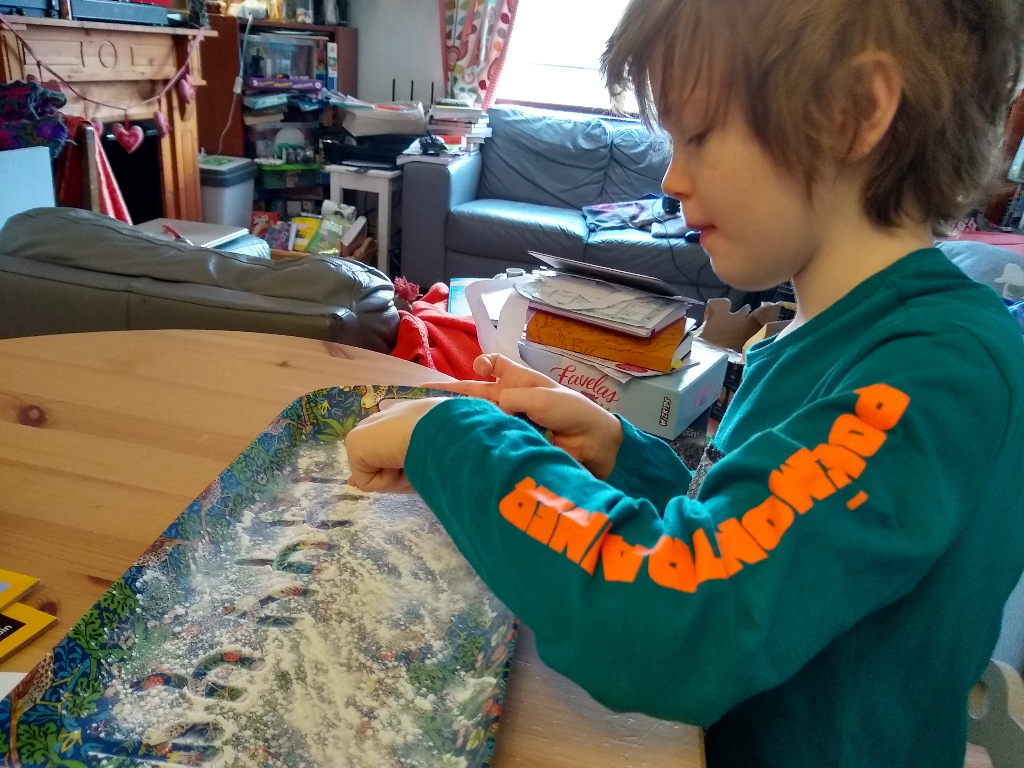
Mercifully we don’t have to do this either.
I should probably say that I don’t have a problem with phonics. What I have a problem with is phonics being promoted as the only way to learn to read.
I think that reading should start with books! Unfortunately in English schools at the moment, the mechanics of reading are taught so that children can pass a test at the end of Year 1. The pass mark for this test is 80%, and as part of it, children have to read words that are not real words. This is to test that the teachers are teaching phonics exclusively.
After a year at school, Cosmo could barely read. Now, with a little bit of help, he can read easy first chapter books. We’ve done some phonics, word families and sight words, but I suspect that the thing that’s made the biggest difference is that he’s part of a family where reading is normal and he has unlimited access to books.
How On Earth Do You Teach Your Kids When Mine Won’t Do Anything I Tell Them To?
This is a big one.
Lots of us who sail into home education with the idea that it’s going to be like school with us being the teacher find very quickly that that ship is full of holes!
This is particularly true if you have a child for whom school just didn’t work.
Let’s just think for a sec.
If school didn’t work for your child, why would it work if you recreated the same thing at home?
And even if school was, or is, fine, why would you want to make home like school? Maybe we need to make education like home!
It’s also worth remembering that a lot of what goes on a school has more to do with managing large groups of people and government expectations than with education and how children learn.
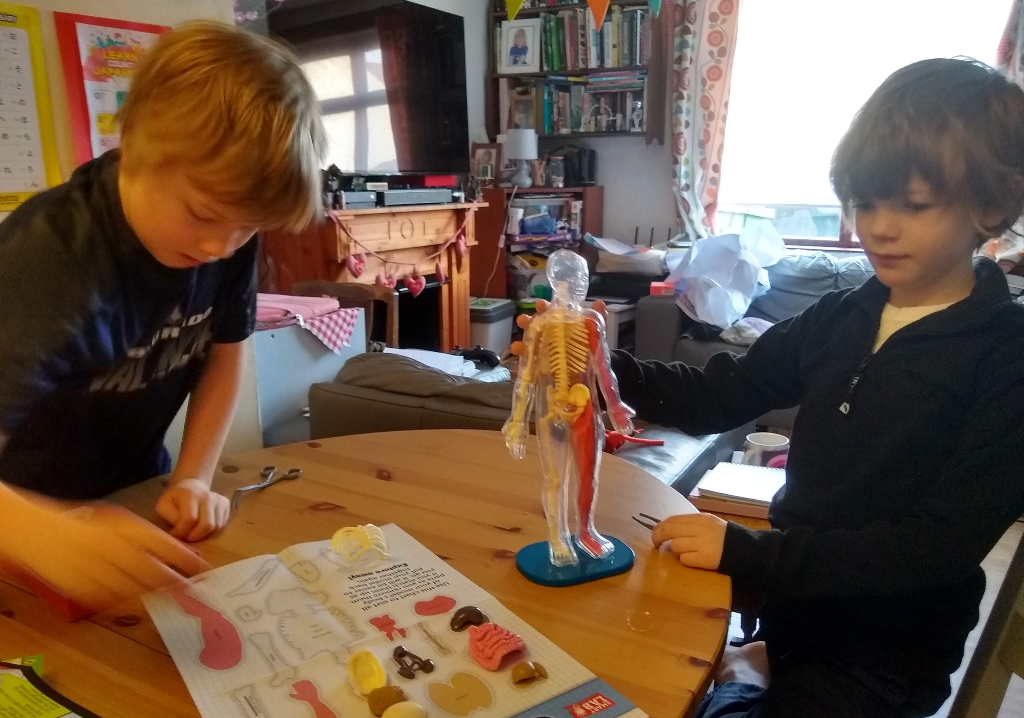
In home education, we are parents first and foremost, not teachers in the school sense. But our children still learn so much from us!
By the time a child is 5, they can walk, feed themselves and dress themselves. They can use the toilet. They can share and take turns at least sometimes. There are so many things they’ve learnt about the world around them already. And they’ve mastered language, which is a huge thing!
Children are not taught most of these things, but they learn to do them anyway. Cosmo wasn’t taught to do any of them! I didn’t even do toilet training with him because I suspected he’d do it himself when he was ready, which he did.
As they get older, children’s learning still happens all the time, not just in school. Learning happens without classrooms, worksheets, writing, a curriculum, tests or rules. It happens without qualified instructors. It even happens without adults!
So lots of home educating parents see themselves as facilitating their children’s education, rather than running a kind of school from their kitchen table.
Being a facilitator is about providing your children with opportunities for learning rather than actually teaching them.
This can take the form of finding documentaries for them to watch, books that you have already or from the library and materials for them to engage with as they choose. Put them where the child can find them, perhaps draw attention to them, then allow the child to choose. Some things will go down well, other things will not. Sometimes things will take a totally different route to the one you were expecting!
I should probably say at this point that my children don’t have total freedom over what they do. They can learn whatever they like, but they need to have basic skills like reading and writing. In the end, I want them to own their learning. If there’s resistance I find another way and they always have a choice and a say in what they do.
What About Socialisation?
Ask any veteran home educator about this and you will probably met with laughing and maybe some eye rolling!
Think of the most anti social person you know. For me, it’s myself, ha! That anti social person probably went to school.
Now think back to your school days. How many times did our teachers tell us, “You don’t come to school to socialise”?!
Some kids love school and have masses of friends. Some adults have lots of happy memories of having lots of friends.
But this isn’t the case for everybody. School can be a horrible place if you’re sensitive or different.
Some children spend break and lunchtime on their own. Others will be kept in to finish off work and don’t have a chance to play with the other children. Some are bullied. Others are excluded by other children. School is no guarantee of positive interactions with other humans.
For home educated children, there are lots of groups for them to attend. Some of them are structured, others are freer. If the children don’t enjoy a particular group, you can cross it off the list and try another! Unlike school, there’s the freedom to choose.
My boys go to drama classes, forest school, roller skating and another group that’s like mums and tots but with bigger kids. They also do karate and Cubs and Beavers, they meet other kids at the park and when they’re out playing Pokemon Go. One of my boys didn’t really have any friends when he was at school. Now he has lots.
So How Does Home Education Look At My House?
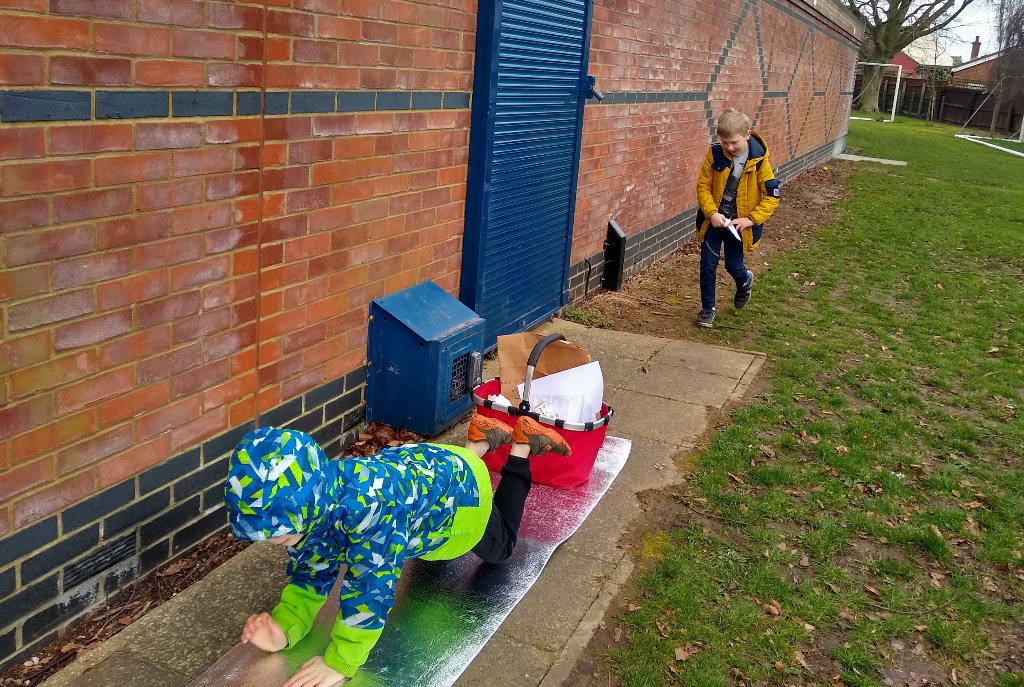
The best thing about home education is that you can do what works best for you and your children. Somebody else’s home education might look very different to ours, and that’s fine! This is what’s working for us at the moment, and it changes and evolves as my boys grow and change.
Monday
On a Monday we’re usually out. The boys attend drama classes in Ely, or we go to forest school. We usually get back home from drama just after 2pm, and the boys will either opt to play, watch a documentary or do stuff on the computer.
Tuesday, Wednesday and Thursday
On Tuesdays, Wednesdays and Thursdays we’re often at home. There are groups on but they’re not every week.
I usually start by reading to them. At the moment we’re enjoying The Secret Garden. I made the decision to read classics because I want to expose them to children’s literature that they might not necessarily pick up and read for themselves. I’ve read them The Railway Children and The Children of Green Knowe, both of which went down a treat! And I’m enjoying revisiting these old friends from my own childhood.
After that we usually do some English and Maths.
With Cosmo, he does a little bit of spelling, handwriting, reading and writing with me. We use the National Geographic levelled readers for reading, but sometimes he’ll read a bit from something else instead. He’s also got a couple of sticker books, and sometimes he’ll read the page to me then do the stickers.
For spelling we use Words Their Way. I was very happy to find an ex library copy on Ebay for £3.75! It focuses on word families rather than phonics and there are lots of suggestions for word sorts and games.
We use Brave Writer for writing. Cosmo has a writing project to do each month. There’s enough flexibility for him to choose what he wants to do. The project for March was a photo journal. Cosmo took some photos and we printed out his favourites. He decided on an order for them and we wrote a caption for each picture. He wrote about half of them himself and I scribed the other half for him. Then we made them into a book.
I wasn’t sure about using a curriculum for writing, but I can’t rate this highly enough. There are samples and other free things to try before committing to anything, and there’s a podcast too. So if you’re on the hunt for something, I’d recommend this!
Barnabas is an avid reader, so getting him to read isn’t a problem! A few weeks ago, he read all 4 of the Mortal Engines books and The Hunger Games in 1 week! And this wasn’t even all he read!
Writing has proved to be an issue. We’re now at a point where he will write if he uses the computer, and I’m in the process of getting him an assessment for dysgraphia. We use a handwriting program called Speed Up which focuses on building up muscles and co-ordination.
Barnabas has a writing project each month too, and he chooses what he wants to write about. He’s currently writing a newspaper report about aliens.
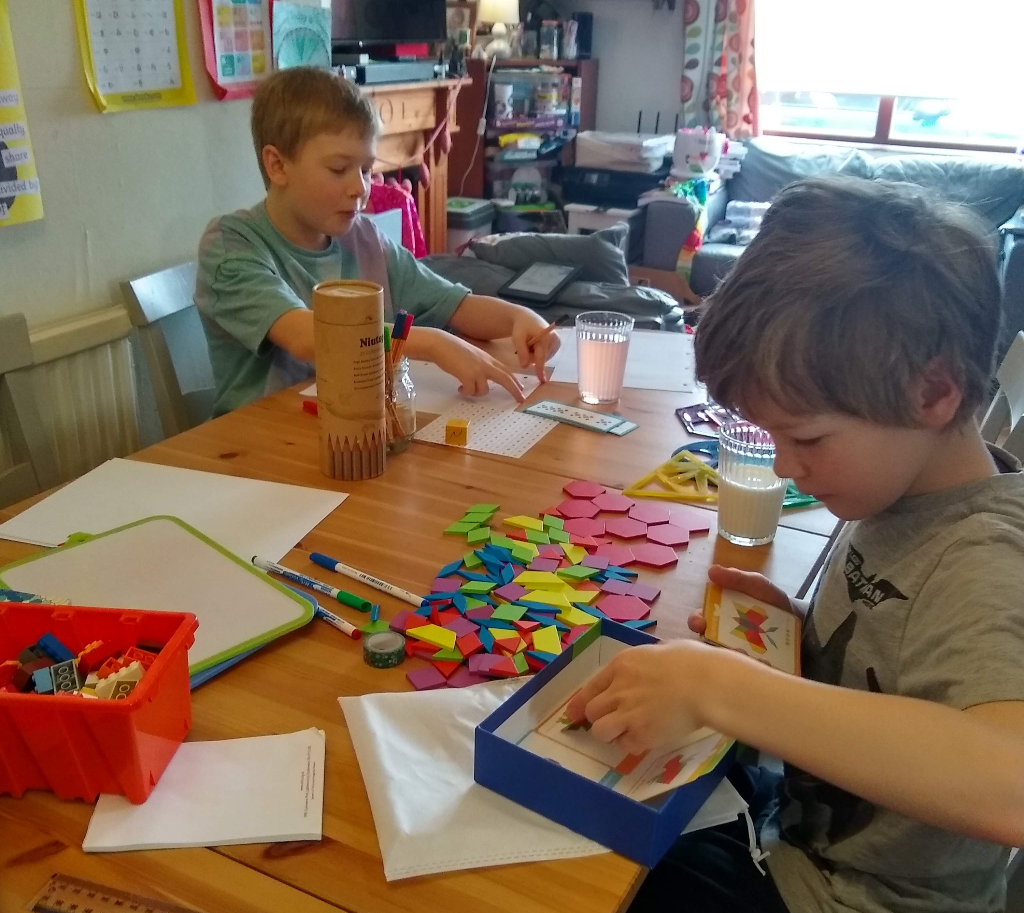
I’ve recently started taking a different approach to Maths. Lots of people have difficulties with Maths, and I’ve been wondering whether it’s because Maths has traditionally be taught as lots of little separate bits of arithmetic. It takes a long time to get to the point of being able to see the bigger picture, by which stage most of us have given up!
So we’re starting with bigger bits of the picture, and I’m calling it Playing With Maths.
We have a theme for the week and we see where it takes us! So far we’ve done paper aeroplanes, patterns, triangles, and ratio and proportion. Areas of Maths covered in this way have included measuring, various kinds of graph, interpreting data, making predictions, number patterns, shapes, algebra, angles, Pythagoras, square numbers and square roots, symmetry, addition and subtraction, fractions, multiplication, ratios in baking and scale in maps and models.
We also do some hands on Science, a poetry teatime (at lunchtime in my house!) and visit the library.
Any time that’s left in the mornings will be filled with other things the boys want to do. They both like making little games in Scratch. Cosmo likes drawing and painting. Barnabas has recently chosen to learn about the Soviet Union, and he’s learnt a little bit of Russian and some Latin. He’s learning to play the piano using an app.
After lunch the boys are free to do what they like. Sometimes we go out for a walk or to the park. They might choose to watch a documentary, do something arty or make something, or play.
Friday
Friday is our grace day. If there’s anything we haven’t managed to do or that needs finishing, we’ll do it on Friday. Otherwise we might go to the library if we haven’t already been that week, or go to a museum. Or we’ll do something arty, or play board games.
At some point this will probably change, but it’s working for us at the moment. My boys are happy and healthy and they’re learning, so that’s good enough.
Some Tips if You’re New To Home Education Or You’re Having To Because the Schools Are Closed
If it’s all going well, that’s great. But if it’s not, if the kids are resistant or the school have stopped sending stuff, here are some suggestions.
Remember that learning doesn’t have to look like school! Younger children learn best through playing. We all learn better by doing rather than being told. We can learn from reading books and also through watching television. Reading and Maths are things we do all the time. Worksheets are not the only way.
Just because something isn’t on the National Curriculum or won’t turn up on a SATs test, it doesn’t mean that it’s not worth learning. If your children what to learn something, then that’s a good enough reason. And if you’re worried about English and Maths, it comes up in everything, even Minecraft!
Lessons in life are useful ones to learn. This includes tidying up, cooking and doing laundry, as well as sticking to a budget and understanding why people pay taxes.
Remember that even at school, children don’t just do English and Maths. Physical exercise is important. Playing with a ball or on some play equipment helps them to develop gross motor skills, strength and co-ordination, as well as wearing them out so that they sleep well.
Art and the arts are valid. Imagine if somebody had told Leonardo Da Vinci that he shouldn’t bother with drawing because times tables are more important! The arts encourage children to develop motor skills, observational skills, language, self expression and fine motor control, not to mention that people can and do earn a living doing these things!
There doesn’t have to be a clear distinction between home and school. The whole of life is learning and if the lines are blurred, that’s fine. Your kids aren’t at school, so lets not make home like school! Lets make ongoing learning and education part of life at home, complete with a snack, a blanket and a favourite pet if it helps things along.
Strewing is one of my favourite things. It basically means leaving things lying about for your children to engage with. This could be books, or little trays with science bits in them, magnetic letters, art materials, anything! It helps if the table is clear apart form the things you want them to do. If it’s yet another thing in the mess they might not notice (guess how I know!).
Another version of strewing is sitting down to do something yourself. Maybe some art things or a microscope that plugs into your phone, or a project of some sort. Your children will probably want to know what you’re doing and will want to join in, especially if you pretend to be a bit precious about it.
Find out what they want to learn! Growing stuff, a foreign language, how a car works, whether Bigfoot really exists and what did actually happen to Amelia Earhart! As I’ve said before, there’s lots of learning in all kinds of things, and it’s much easier for everybody if the children are learning things they want to learn.
Sewing is a fun thing to with children and there’s plenty of maths involved! They might like to make their own trousers, or they could try a drawstring bag from a pillowcase!
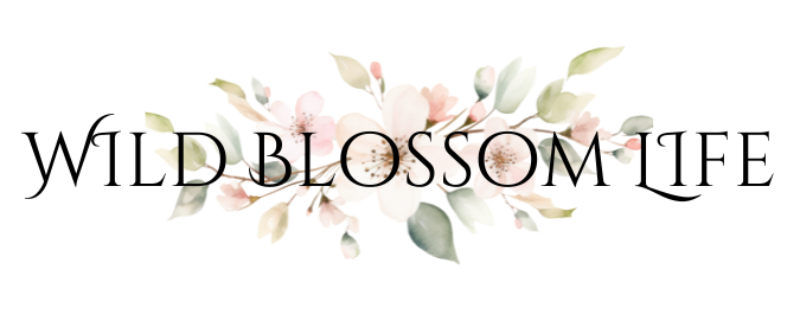
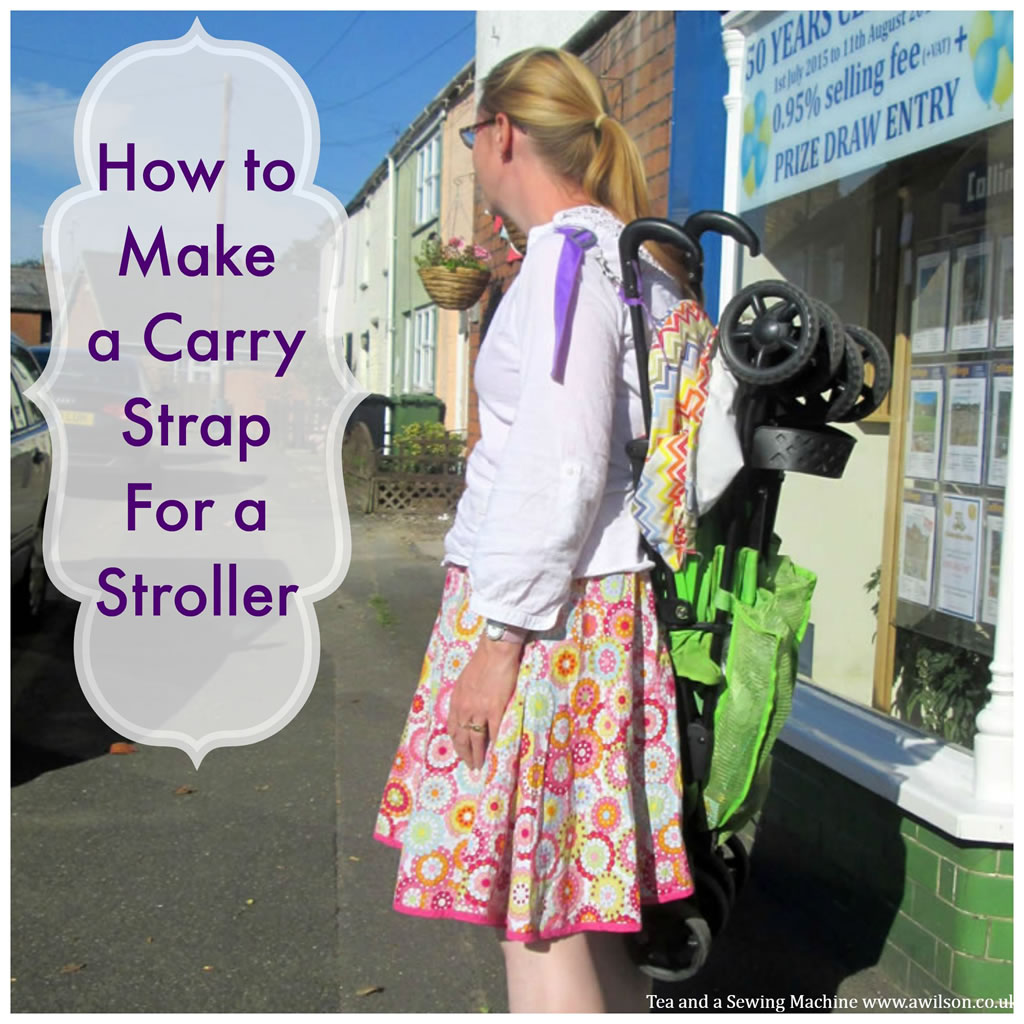
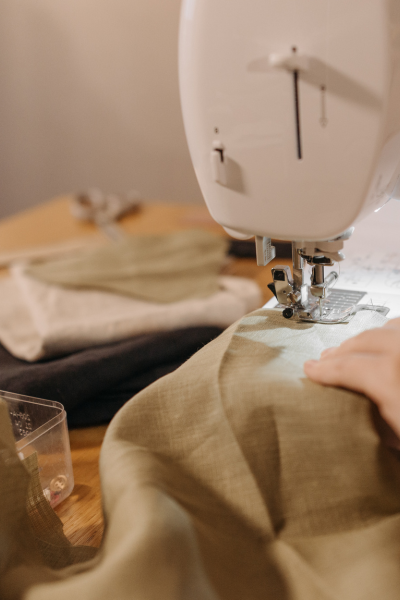


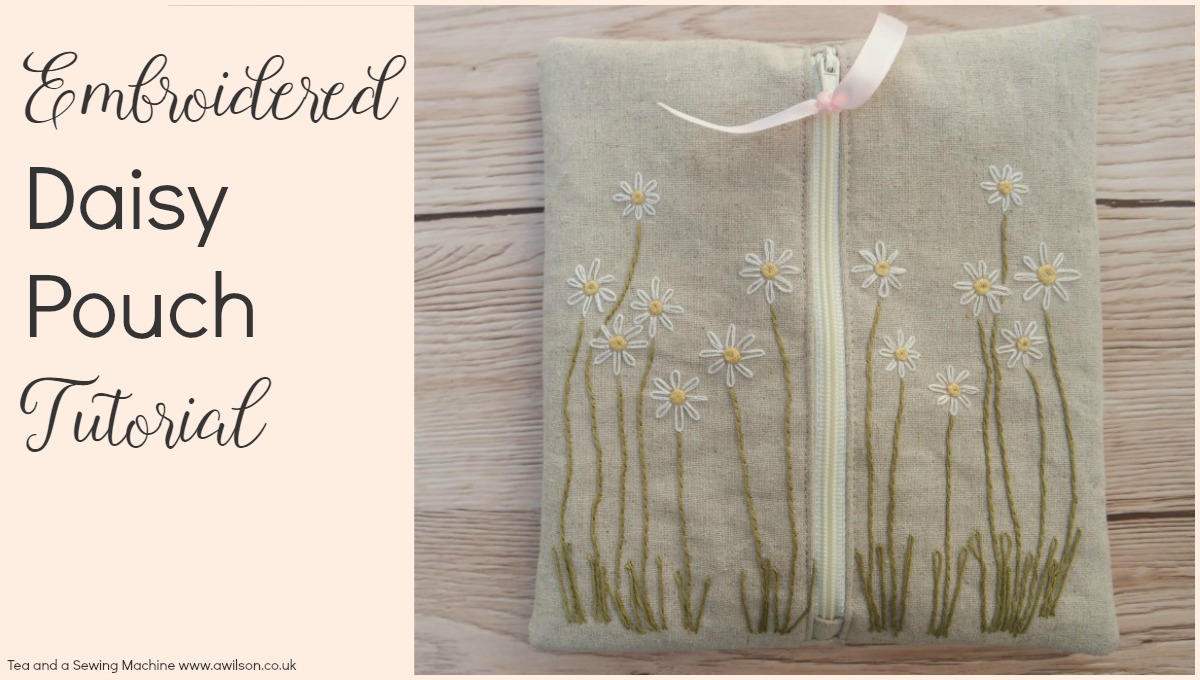
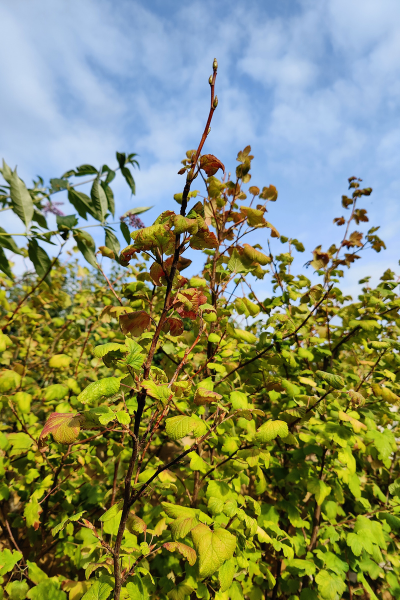
I found the section on language learning strategies especially helpful. Thank you for this.
This isn’t an anti-school rant—it’s a call to redefine ‘education’ as something that happens everywhere. Whether in classrooms or living rooms, the goal is the same: kids who love learning, not just obeying.
“The best education doesn’t prepare children for school. It prepares them for being.”
Thanks for the information! It’s so inspiring to hear how home education positively impacted your family—especially Barnabas. Your story really shows how alternative paths can lead to wonderful outcomes. gelmar
Wow, this is amazing! I never thought about things that way. You’ve given me a lot to think about thankyou
Home education, or homeschooling, is an increasingly popular alternative to traditional schooling, offering families the flexibility to tailor learning experiences to their child’s unique needs, interests, and pace. It’s not just about replicating school at home—it’s about creating a personalized approach to education that fosters curiosity, independence, and lifelong learning.
For many families, home education looks like a mix of structured lessons, hands-on activities, real-world experiences, and even online courses or community programs. The beauty of it lies in the ability to adapt the curriculum to align with a child’s strengths and passions, whether that’s diving deep into science, exploring the arts, or developing practical life skills.
However, homeschooling isn’t without its challenges—finding resources, staying consistent, and ensuring a well-rounded education can sometimes feel overwhelming. That’s where professional guidance and tools can make a difference. For example, organizations like PDCA Consulting offer training and frameworks (like Agile or PRINCE2) that can help parents structure their approach, manage workflows, and even teach valuable organizational and problem-solving skills to older students.
How does home education look for your family? What are some of the biggest benefits or challenges you’ve experienced? Let’s share ideas and support each other in creating meaningful learning experiences for our kids!
This is such a fantastic read! I really appreciate how you’ve shared your personal experience with home education and made it so relatable. It’s inspiring to see how flexible and tailored the learning process can be, and your insights show just how much freedom and creativity home education can offer. It’s definitely a great option for many families looking to create a more personalized approach to learning.
For anyone looking to further enrich their home education journey, I recommend checking out Experttutor.com. It’s a platform that offers fantastic, personalized educational support for learners of all ages.
“The article covers the topic of homeschooling, with the author sharing her experience of educating her children at home. She highlights how home education can be a great choice for kids who struggle in school and offers more flexibility than traditional schooling.
I found this article to be very informative. I really liked it!”
The article discusses homeschooling, with the author sharing her personal experience of educating her children at home. She highlights that homeschooling can be an excellent option for children who face challenges in traditional schools, providing greater flexibility compared to conventional education methods.
It is really informative.
I love your blog post. It is informative.
The article talks about home education. The author shares her experience homeschooling her kids. She says home education is a good choice for kids who have trouble in school and offers more flexibility than traditional schooling.
This article is very informative. I like it.
This article is very informative. I like it.
The basis of our civilization is its educational system, which develops young minds and promotes advancement in all spheres. They are more than just educational settings—they are communities that mold character, impart values, and get kids ready for life’s problems. In addition to academics, schools provide a range of experiences that set students up for success. Let’s acknowledge the vital role that education plays in shaping the leaders of tomorrow.
Thanks goes to you…